- Home
- Leslie Meier
Haunted House Murder Page 3
Haunted House Murder Read online
Page 3
Perhaps she should try the back door. She’d gone to the front because she had approached from the street, and because she felt it was a bit more polite since she didn’t know the Moons. Most people in Tinker’s Cove came and went through their back doors; front doors were mostly for show. In fact, a lot of people never actually opened their front doors and filled their unused entrance vestibules with golf bags, fishing rods, croquet sets, and out-of-season coats and boots, using the space as a sort of extra closet.
She made her way around the house, where she perched on a rickety set of unsteady steps and banged at the kitchen door. The door had a window, covered with a rather grimy bit of gingham curtain, and after she’d banged a second time she saw the curtain twitch, and a face appeared. A rather handsome face, with a beard and wire-rimmed glasses.
The door opened a crack. “Yes?” said the owner of the beard and eyeglasses, who appeared to be a well-built man in his mid-thirties, dressed in jeans and a black turtleneck sweater.
“Hi!” said Lucy, realizing she sounded awfully enthusiastic. Toning it down, she continued. “I’m a neighbor here in town and I just wanted to introduce myself. I’m Lucy Stone and my husband, Bill, is a restoration carpenter. We thought you might be considering some renovations, so I have some information for you. . . .” She produced the colorful brochure Bill was so proud of, offering it to the man, whom she believed must be Ty Moon.
“Not interested,” he said, stepping back and starting to shut the door.
Lucy wasn’t a reporter for nothing; she’d picked up a few tricks of the trade. “Oh, my,” she moaned, putting her hand to her head.
As she’d hoped, the door opened a bit wider. “Are you all right?”
“I’m a bit dizzy. Perhaps if I could sit down?” She was looking past him, at the glossy black high-top table and stools that seemed out of place in the shabby old kitchen.
“I can call nine-one-one,” he offered.
Behind him, Lucy saw a woman standing in the kitchen doorway. She had long, almost white hair and seemed to be wearing some kind of nightgown. Was this Heather? And why was she wearing a nightgown when it was almost lunchtime?
“Ty, is something the matter?” she asked, in a soft voice that was little more than a whisper.
“It’s under control,” he snapped.
“If you say so,” she replied, vanishing so quickly that Lucy wondered if she’d actually seen her, or if she was only some sort of ghostly apparition.
“Well, do you want me to call the rescue squad or not?” demanded Ty, sounding as if he was losing patience.
“No, no. I’m feeling better,” said Lucy. “Thanks anyway.”
He shut the door in her face and, somewhat shocked, she stepped down carefully, holding on to the splintery wooden railing, and headed back to the street. She glanced at the windows on the side of the house, but the shades were all down even though it was a bright, sunny day. Who does that? she wondered. Closed shades were definitely a worrisome sign in Tinker’s Cove. What were they hiding? Reaching the sidewalk, she tucked the brochure in the brand-new rural mailbox that had been installed by the road, snapped the little door shut, and crossed the street.
That was pretty weird, she thought, as she started her car and pulled out onto Oak Street. Stopping at the corner of School Street, she took one last look at the house before turning right and heading toward the Pennysaver office on Main Street. She might be wrong, she admitted to herself, but it didn’t seem as if the Moons had any community spirit and weren’t the least bit interested in getting to know their neighbors. And as for Ty Moon’s handsome features, she was reminded of her mother’s frequently voiced reminder that “handsome is as handsome does.” Judging by that standard, Ty wasn’t good-looking at all.
Chapter Three
As Janet Nowicki had pointed out at the selectmen’s meeting, the Tinker’s Cove school department budget didn’t run to a late bus, so Lucy had to pick Patrick up after soccer practice on Tuesdays and Thursdays. This first Tuesday was a bright, crisp fall day and she was enjoying the sunshine and the colorful yellow and orange trees that surrounded the field. Patrick seemed to be having fun, chasing the ball and getting a few kicks in, which was a relief, since she’d been worried about whether he’d fit in with the kids in the new school. That didn’t seem to be a problem, she decided, watching as the other kids high-fived him when the practice was over.
Spotting his jacket and backpack lying on the ground, she picked them up and approached the little knot of players, who were deep in some sort of discussion. As she drew closer, she realized they weren’t talking about the practice, but were instead debating whether a witch actually lived in the haunted house across the street.
“I saw her; she has a hooked nose and a big wart on her chin,” declared one boy, who she thought might be one of Dottie Halmstad’s grandkids. He had that very blond, almost white hair that was a Halmstad trait.
“When I walked by the house I heard groans and weird noises,” offered a little girl with quite a few missing teeth.
“And I saw a black cat over there,” added a slightly chubby kid, whose shirt didn’t quite reach his soccer shorts and showed some bare belly. “And the house number is sixty-six. That’s a sign of the devil.”
“Nah, it’s got to be three sixes,” said the blond kid.
“Maybe one fell off,” suggested the chubby kid.
Patrick was taking it all in, looking a bit scared. “Hi, Grandma,” he said, sounding relieved to see her.
“That’s all a lot of nonsense,” she told the group. “That house isn’t haunted; it just needs some paint. The people who moved in aren’t witches or monsters; they’re just regular people. I’ve even met them.”
“My mom says they’re stuck up,” offered the chubby kid. “She took them some muffins she made and they said they didn’t want them because they were too gluey or something.”
“Maybe they only eat gluten-free foods,” said Lucy, not the least bit surprised at the idea.
“Yeah, my sister’s gone gluten-free,” said the little girl with missing teeth. “My mom says it’s ridic’lous.”
“My mom says they can go eat worms,” said the chubby kid, spotting the arrival of a very large SUV. “That’s her now. I gotta go.”
“Well, my mom said I shouldn’t go trick-or-treating at that house,” said the young Halmstad boy. “She said it wasn’t a good idea.”
“Not everybody likes Halloween. You should listen to your mom.” Lucy handed Patrick his jacket and together they started walking to the car.
“Grandma?”
“What’s on your mind, Patrick?”
“Do you think that house really is haunted?”
“No.”
“Does a witch live there?”
“No. There’s a man and a woman—their names are Ty and Heather Moon. I Googled them and he works in screen arts and she’s an interior designer.” Lucy didn’t mention that she hadn’t the faintest idea what “screen arts” actually were, but supposed it had something to do with creating silk-screen designs for T-shirts. She also didn’t mention her surprise that the Moons hadn’t eagerly accepted Bill’s brochure, if Heather was planning to use her interior design skills on the old house. Of course, she admitted to herself, as a design professional Heather might already have developed relationships with contractors she preferred to work with. Contractors who weren’t local and, whom Lucy smugly assumed, would charge an arm and a leg, and probably do inferior work.
“Are they nice?”
For a moment, remembering her encounter with Ty Moon, Lucy wasn’t sure how to answer. Those Moons had seemed pretty odd, and Ty was positively unfriendly. Then she remembered her mother saying you couldn’t understand anyone until you’d walked a mile in their shoes, and she bent down, looking Patrick straight in the eyes. “I’m sure they are,” she said. “I’m sure they’re very good people.”
When they got home, Lucy got Patrick settled at the kitchen table wit
h his homework, and some milk and cookies. Not homemade—those were long gone—and she’d resorted to giving him Oreo cookies. They were on sale this week and she’d bought the allowed limit, stocking up. Libby stationed herself next to Patrick, ever hopeful that a bit of Oreo might come her way.
Lucy was humming to herself as she unpacked the groceries and unloaded the dishwasher, preparing to start cooking dinner. Patrick, she noticed, seemed to be making a lot more headway on his snack than on his homework, which was a sheet of math problems.
Setting the last glass in the cabinet, she went over and took a look at the paper, which was a series of addition problems with fractions. “Confused?” she asked.
“Yeah. I don’t get it.”
Remembering a trick she’d used with her kids, Lucy got out her measuring cups and lined them up by size on the table. “Here we’ve got a whole cup. That’s one. This cup is a half. It takes two half cups to make one cup.”
“But two is more than one,” said Patrick.
“That’s true,” said Lucy, scratching her head. “Okay, let’s try this.” She filled a pitcher with water and used it to fill the half cup and had Patrick pour it into the one-cup measure. “That’s one-half, see?”
Patrick nodded, and she filled the half cup a second time. “Now pour it into the cup.”
“It’s full,” he said.
“Do you see? Two one-halves make a whole one. It’s the same for four quarters. Four make one.”
“Okay. But what’s this one here, three over two?”
Lucy sighed. It was going to be a long afternoon. She was still soldiering on, trying to help Patrick with his homework, when Sara came home, dropping an armful of books on the table by the kitchen door and shrugging out of her puffy jacket, which she hung on a hook. She then kicked off her Ugg boots, leaving them where they landed in the middle of the kitchen floor.
“Do you mind?” asked Lucy, giving her a look.
“It’s all right if Patrick leaves things everywhere, but not me?” She pointed to Patrick’s jacket, which was lying on the floor in the corner, where he’d tossed it.
Lucy rolled her eyes. “Patrick is eight. You’re not.”
“Mom,” began Sara, in an aggrieved tone, “I’ve got to prepare for my orals and I can’t get any work done here because he’s always playing those noisy video games. It’s wham, bang, crash, all the time and I need quiet to concentrate.. . .”
“It’s quiet now,” said Lucy. “Why don’t you study now?”
“Oh, Mom. You don’t understand anything. I can’t study now!”
“Why not?”
“I’m exhausted, that’s why.” Sara let out a huge sigh. “I had to teach two undergrad chem labs, if you can imagine it. Two! One right after the other. They treat us teaching assistants like scum. And believe me, it’s a miracle those idiots didn’t blow up the building.” She gave a little shudder. “Ugh. I need a shower.”
“We’ll work it out,” said Lucy, reaching for Patrick’s social studies book. “Hey, since you can’t study, after your shower, would you mind peeling some potatoes? I’m helping Patrick with his homework.”
Sara paused at the bottom of the stairs, her hand on her hip, and gave a toss of her shoulder-length blond hair. “I’m not a slave, you know.” Then she turned and thumped her way up the stairs.
“Okay, Patrick,” said Lucy, checking off Patrick’s completed homework assignments. “Just one left. A paragraph about what costume you’re going to wear on Halloween and why.”
“I don’t know yet,” said Patrick.
“Really?” inquired Lucy, somewhat concerned. These days you couldn’t wait until the last minute to get a costume; they went fast. She’d noticed that the display in the drugstore was already pretty depleted.
“No. I couldn’t decide what to be.”
“Any ideas now?”
“Well, Mom had this idea about these two guys, Dr. Jackal and Mr. Wide. . . .”
“You mean Dr. Jekyll and Mr. Hyde?” prompted Lucy.
“Maybe. It was going to be two-sided. I’d be this doctor on the front and the other guy on the back. . . .”
Lucy sighed. That sounded just like something Molly would come up with. Something terribly ambitious and absolutely impossible for her to manage. Executive action was definitely called for. “First things first. You’ve got to write a paragraph about a costume. We don’t have a costume yet, so why don’t you write about something you’d like to be? Say a pirate. That’s definitely doable, even if we can’t find a costume. We can make one.”
Patrick’s face was set in a stubborn expression. “I don’t want to be a pirate.”
“Then write what you want to be,” said Lucy, slapping her hands into her lap with exasperation and standing up. “I’ve got to get the potatoes started.”
When Lucy had gotten the potatoes peeled, and simmering on the stove, along with the pot of beef stew she was reheating, she took a look at Patrick’s essay. “I decided werewolf was good, ’cause it’s real scary,” he said.
“Looks good,” said Lucy, smiling at Patrick’s large, childish handwriting and the occasional misspelling. She nodded with approval as she tucked the paper into his folder, hoping that Patrick wouldn’t insist on a wharewolf costume.
The next morning, she stopped at the drugstore on her way to work and discovered that they were completely out of werewolf costumes. Also pirates, zombies, and superheroes. All that was left was Casper the Ghost and Lucy knew that would definitely not fly with Patrick. She’d have to take him shopping after school at the nearest big box store, which happened to be some ways along Route 1 in South Williston.
So as soon as he got off the bus she bundled him into the car and off they went, in search of a costume. It was a bit of a drive to South Williston, but the weather was bright and the roads were clear and they made good time. The store was brand-new, and Lucy had mixed feelings as she parked the car and helped Patrick out of his seat belt, which had gotten stuck. It was certainly convenient to have the gigantic store, which sold everything under the sun at very good prices, but it didn’t seem very Maine somehow, squatting alongside the road in the middle of a huge parking lot. “What did we do before we had it?” people asked, but it seemed to Lucy that people had managed pretty well. Instead of the cheap imported work boots that the big box store sold, people bought more expensive, but better made work boots from Country Cousins, which lasted forever and could even be repaired. And as for Halloween costumes, well, people improvised and got creative, making them from scratch.
“Do you think they’ll have werewolf costumes?” asked Patrick, interrupting her thoughts.
“I hope so,” she said, as they crossed the immense parking lot and approached the huge brick monolith. Stepping through the doors, which opened automatically, Lucy felt for a moment as if she were being swallowed up.
Dazzled by the bright lights inside, Lucy took Patrick’s hand and headed for the area where seasonal merchandise was displayed. There, amazingly, they found one lonely werewolf costume, in Patrick’s size.
Nearby, she noticed a display of laundry detergent, her brand, at a fabulous price. And beyond that, some rather attractive sweaters, amazingly cheap. “Okay,” she said, grabbing a couple of jugs of detergent, “we’re going to need a cart.”
Lucy and Patrick had no trouble at all filling the cart, topping it off with a large pumpkin, planning to add it to the one she’d already bought at the IGA. This one was half the price that she’d paid for the first, and a fraction of the price out at MacDonald’s farm stand, where you had to pick your own. Lucy was terribly pleased with her shopping when she got in line at the checkout. She expected a hefty bill, but she was getting excellent value, and wouldn’t need to buy detergent, or coffee, or toilet paper anytime soon.
She was checking the balance in her checking account when there was a fuss at the next checkout lane. She turned to see what the matter was and saw that someone had fainted, collapsed on the industrial
tile floor.
The store manager was already there, bending over the woman, who was protesting in a weak voice that she was really all right.
“Take your time, there’s no rush,” advised the manager, a young guy wearing the company’s ugly yellow polo shirt.
“Really, if you’ll just give me a hand . . .”
The manager took her hand, and also her elbow, and gently helped her to her feet, where she supported herself by grabbing the handle of her shopping cart and hanging on for dear life. “I’m fine,” she said.
Lucy was quite sure the stricken woman was Heather Moon, whom she’d glimpsed the other day, and she sure didn’t look fine. She was ashen faced, and terribly thin, with long, stringy hair that was prematurely gray, and dressed in baggy washed-out pants and shirt that looked like pajamas. Her hands, which were gripping the cart handle, were red and chapped looking, and as she stepped forward in the line she seemed to be in pain. The manager watched for a moment, then went to answer the flashing light at checkout number thirteen.
“Perhaps you remember me,” said Lucy, speaking to her. “I stopped by your house the other day and spoke to your husband.”
“Yes?” Heather looked at her blankly.
“Well, I’m from Tinker’s Cove and if you need a ride home, or some help . . .”
“Thank you,” she said, pushing the cart forward with a little jerk. “But I’ll be fine. My husband is waiting for me outside.”
“Okay,” said Lucy, as Patrick began unloading their cart onto the conveyor belt. “But if you need anything, well, that’s what neighbors are for.”
Heather didn’t answer, but reached for a gallon jug of cider and struggled to lift it. “Here, let me help,” said the man in line behind her, taking it and setting it on the checkout counter.
Lucy’s attention was taken by her own order, and when she’d finished paying and gotten her receipt, Heather was already gone. Maybe she’d see her in the parking lot, she thought, concerned for the frail woman’s welfare, but when they stepped outside there was no sign of Heather, or Ty Moon.

 Christmas Card Murder
Christmas Card Murder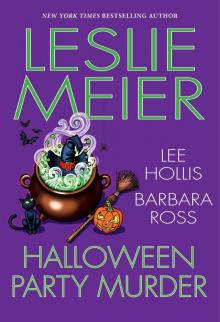 Halloween Party Murder
Halloween Party Murder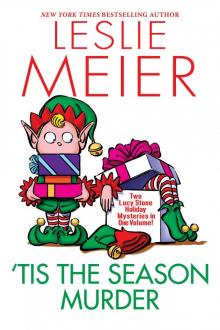 'Tis the Season Murder
'Tis the Season Murder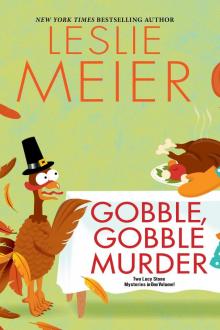 Gobble, Gobble Murder
Gobble, Gobble Murder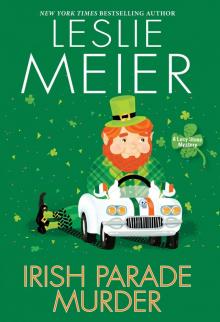 Irish Parade Murder
Irish Parade Murder Bake Sale Murder
Bake Sale Murder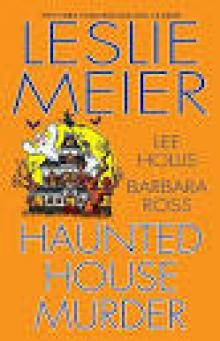 Haunted House Murder
Haunted House Murder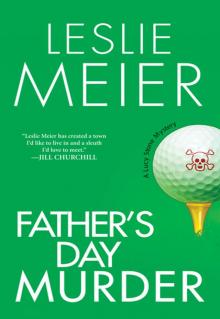 Father’s Day Murder
Father’s Day Murder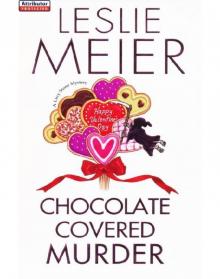 Chocolate Covered Murder
Chocolate Covered Murder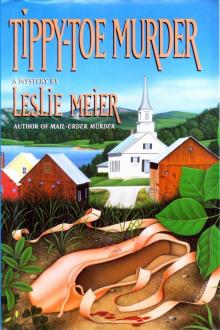 Tippy Toe Murder
Tippy Toe Murder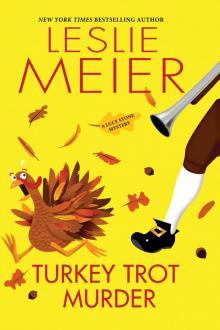 Turkey Trot Murder
Turkey Trot Murder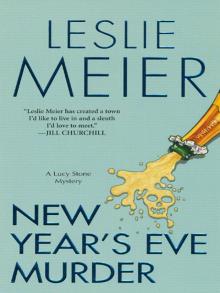 New Year's Eve Murder
New Year's Eve Murder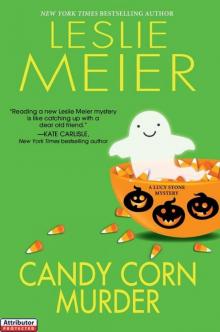 Candy Corn Murder
Candy Corn Murder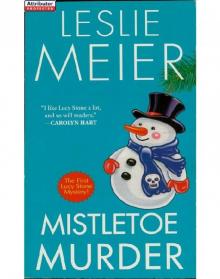 Mistletoe Murder
Mistletoe Murder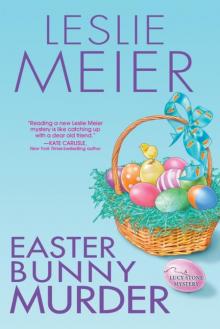 LStone 20 - Easter Bunny Murder
LStone 20 - Easter Bunny Murder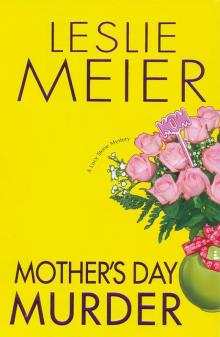 Mother's Day Murder
Mother's Day Murder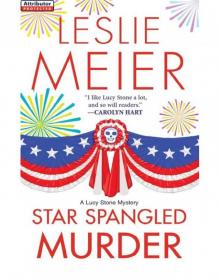 Star Spangled Murder
Star Spangled Murder Silver Anniversary Murder
Silver Anniversary Murder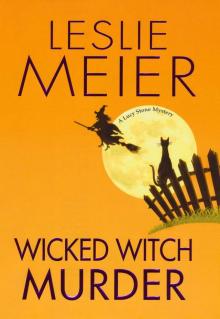 Wicked Witch Murder
Wicked Witch Murder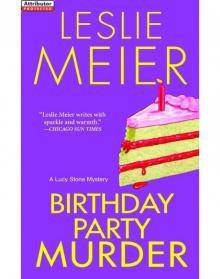 Birthday Party Murder
Birthday Party Murder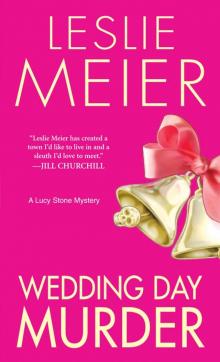 Wedding Day Murder
Wedding Day Murder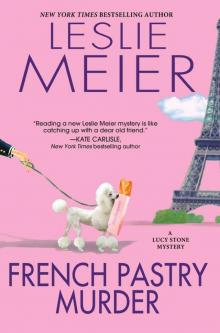 French Pastry Murder
French Pastry Murder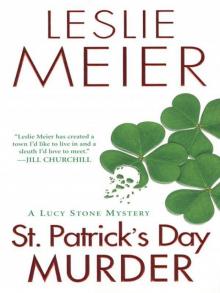 St. Patrick's Day Murder
St. Patrick's Day Murder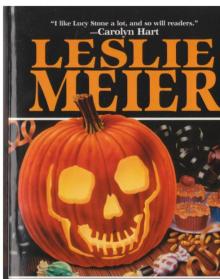 Trick or Treat Murder
Trick or Treat Murder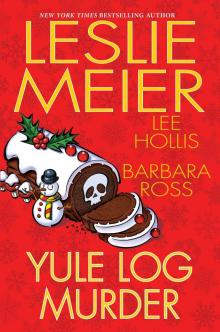 Yule Log Murder
Yule Log Murder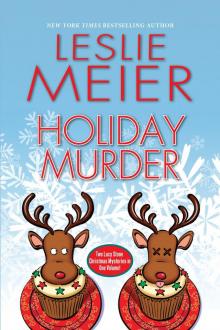 Holiday Murder
Holiday Murder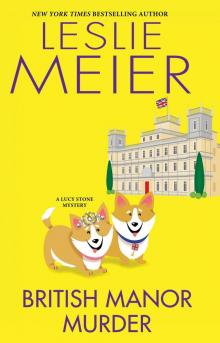 British Manor Murder
British Manor Murder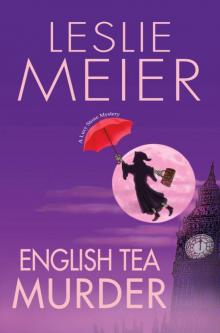 English Tea Murder
English Tea Murder